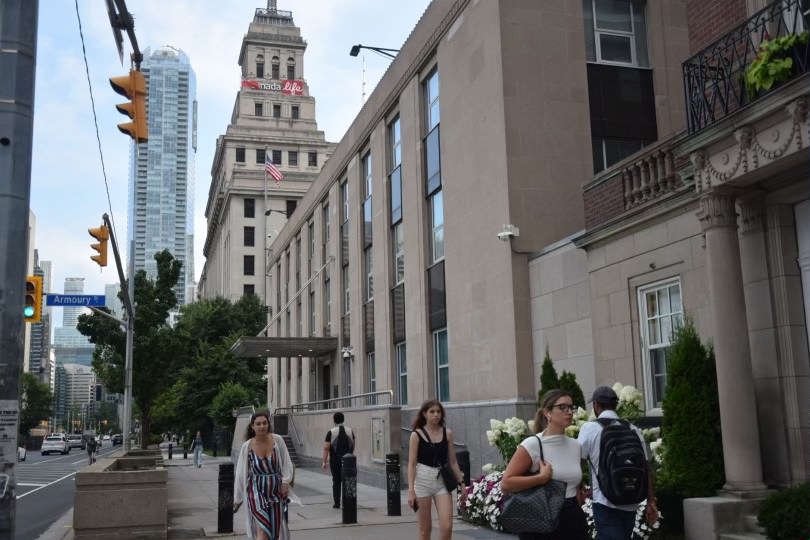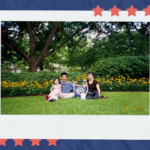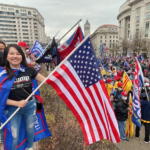 Millions of eligible American citizen voters live around the world, yet only a few vote, facing difficulties throughout the voting process.
Millions of eligible American citizen voters live around the world, yet only a few vote, facing difficulties throughout the voting process.
Published August 9, 2024
 Muzna Erum
Muzna Erum

People walk by the U.S Consulate in Toronto, Ontario on, July 31, 2024. U.S. citizens can reach out to the consulate for questions about the overseas voting process.(Muzna Erum for AAJA Voices)
Despite living outside the United States, Aaron Singer, a teacher who currently lives in Paris with his wife, knew it was important for him to vote in the 2020 elections. But he had no idea where to start as an overseas American voter.
Through his research into the voting process for Americans living abroad, he came across the Association of Americans Resident Overseas (AARO), a non-profit that advocates for the rights of Americans living abroad.
“When you leave the United States, they don’t give you, ‘Okay, here’s all the information that you’ll need to continue, you know, to exercise your rights as an American,’” said Singer.
With the assistance of AARO, Singer, who has also lived in Japan and Indonesia, was able to vote for the first time as an overseas American.
The Federal Voting Assistance Program (FVAP), a U.S. federal program that assists and provides overseas American voters with tools to vote, estimates that 4.4 million American citizens live abroad, but only 2.8 million are of eligible voting age. In the 2022 midterm elections, only about 95,000, or 3.4 percent, of eligible expatriate voters submitted their ballots.
Experts and advocates have found that overseas Americans face several obstacles during the voting process, thus making them less likely or even interested in voting. The FVAP has found that some of the obstacles voters must navigate include annual ballot registration, ballot deadlines, and, at times, navigating an unreliable postal system outside the United States.
If these obstacles to voting were removed, the FVAP believes the expected overseas voter turnout could be much higher.
Like many others, Singer’s process of receiving his absentee ballot begins with registering and filling out the Federal Post Card Application with his local elections office. Singer votes in California, where he last lived before moving abroad, as voters are required to vote in the last state in which they resided before leaving the U.S. Once registered, elections officials typically send ballots to voters 30 to 45 days before the election. Voters are then required to return the filled-in ballot as soon as possible.
Finding the time to register, finishing all the paperwork and sending his ballot back within the time limit, Singer explained, have been the most challenging parts of the overseas voting process.
He and his wife have already submitted the required paperwork for the upcoming election to ensure their ballots are received in time.
Todd Huntley, who moved to the U.K. in 1995, first learned about Vote From Abroad (VFA) in 2020 after attending a volunteer recruitment drive.
VFA is a platform provided by Democrats Abroad, a partisan organization affiliated with the Democratic Party, to assist U.S. citizens living overseas through the voting process.
“I think that’s probably the biggest reason people don’t vote is they think it’s going to be complicated,” Huntley, a semi-retired entertainment professional, explained.
This year, he has committed to working full-time with VFA to help other overseas Americans cast their votes in the 2024 election.
Huntley specifically recalls not voting in U.S. elections while living abroad as he did not know he could vote. It wasn’t until he contacted Minnesota election officials that Huntley realized he could participate, leading him to vote abroad for the first time in the 2008 presidential election.
As a volunteer, Huntley finds that many Americans overseas hesitate to vote due to the perceived complexity of the voting process, which varies by state. Some states accept electronic ballots, while others require mail-in returns. Each state has different procedures and deadlines.
“It’s not strictly a complicated process, but there are multiple steps,” Huntley said. VFA’s platform helps simplify this process by allowing voters to request their ballots based on the state in which they are voting.
Susan Dzieduszycka-Suinat, CEO and president of the U.S. Vote Foundation, an organization which assists overseas voters, hopes to address this issue by simplifying the process.
Instead of requiring voters to go through the whole registration process to receive a ballot, she envisions a system in which voters can submit a combined registration form and filled-in ballot.
“That is a one-step process for which we already have all the necessary mechanisms. It could be done, but it must be codified into law,” she explained.
She views this as the most important reform she is currently advocating for the FVAP to implement.
Dzieduszycka-Suinat’s journey to creating the U.S. Vote Foundation came after the September 11 attacks when she decided to look into the FVPA for the first time.
“I guess I woke up out of my unengaged state as an American and thought, ‘I gotta get involved,’” she said.
In 2001, she said that the voting process was all on paper and included a 500-page instruction book. Coming from a background in software and business, Dzieduszycka-Suinat decided to take the book and automate the system to help others learn to vote.
She believes the low participation rate is due more to Americans’ lack of awareness of their right to vote and “deeply ingrained misconceptions,” rather than the challenges surrounding voting itself.
Some of these misconceptions, she’s found, revolve around voters believing they need property ownership to vote or can face tax implications. Another common misunderstanding she’s encountered is overseas voters thinking their ballots don’t matter or even count.
This mix-up, Dzieduszycka-Suinat has found, often stems from the 2000 presidential election, where a recount of ballots in Florida was conducted.
In 2000, during the presidential race between George W. Bush and Al Gore’s presidential race, late-arriving ballots from overseas citizens and military members helped Bush win by 537 votes.
Had those ballots not been counted due to strict deadlines, Gore could have won the race, sparking a debate over the validity of overseas ballots.
For Alana Boisvert, a community organizer who currently lives in New Jersey, her biggest challenge as an overseas voter wasn’t a lack of knowledge, but the mailing system.
From 2020 to 2024, Boisvert studied at the University of Toronto in Canada. While attending college, she voted in her first American elections as an overseas citizen in the 2020 presidential election and again in the 2022 midterm elections.
“I would say the entire voting process is actually really difficult compared to most processes I’m used to. Even applying to university was simple,” said Boisvert.
Despite her strong civics education, which taught her a lot about the U.S. voting and electoral process, Boisvert was not prepared to navigate the international postal system.
The challenge with voting began, she said, when her dad received her sample ballot back home in New Jersey. Initially, Boisvert believed her parents could vote on her behalf. Once she realized that wasn’t the case, she researched more about the overseas voting process and registered to vote at her local elections office before the deadline. She even spoke to U.S. and Canadian postal service members to see how long it would take for her ballot to arrive in her voting precinct.
However, she only received her ballot 48 hours before Election Day.
“When I got it, I had to rush the ballot, so I had to pay $20 to get my vote to count,” Boisvert said.
Boisvert’s experience of receiving her ballot so late reflects a broader issue overseas U.S. voters face. According to the FVPA, the time it takes to mail electoral material back and forth has been a constant challenge.
In 2014, FVAP estimated that 17,000 ballots from overseas American citizens were not recorded due to “foreign postal obstacles.”
To address these challenges, especially in regions with the most unreliable mailing systems, the Uniformed and Overseas Citizens Absentee Voting Act (UOCAVA), enacted to protect the voting rights of overseas U.S. citizens and active uniformed service members, provides absentee ballot as a backup ballot option for voters.
In 2009, UOCAVA was also amended by the Military and Overseas Voter Empowerment (MOVE) Act, requiring states to offer at least one electronic method for overseas voters to return their ballots. While implementation of the act has been spotty, over half of Americanstates provide electronic ballot return options through fax, online portals, and email.
During the 2022 general elections, more than half of voters had the option to return their ballot electronically. However, the FVPA OCPA 2022 report found many still opted to return their ballot by mail, indicating either a lack of knowledge or trust in the online system.
With the lack of data on the overseas American citizen population, it’s hard to determine the exact power this voting bloc could have on U.S. elections. However, Dzieduszycka-Suinat and Huntley believe overseas citizens have the potential to be a powerful force in tight elections because of the sheer number of Americans living overseas.
Determining the exact number of Americans living overseas is challenging, according to the FVAP report. The population of this group comes through foreign government estimates of U.S.-born residents and those who have declared foreign income to the IRS.
In 2022, the U.S. Department of State’s Bureau of Consular Affairs estimated that approximately 9 million American citizens lived overseas.
But Amanda Klekowski Von Koppenfels, a professor at the University of Kent’s Brussels School of International Studies, believes the FVAP has underestimated the number of Americans overseas.
She’s found that certain counting methods the U.S. government uses to estimate the number of Americans living abroad — such as tracking births reported overseas and passport renewals — can overlook people like her children, who have voted in American elections from abroad.
Von Koppenfels’s husband is German, and her kids have always been registered as German in government records in Belgium, where she and her family currently reside. Her children are not considered American citizens in Belgian government records.
She’s found that people with dual citizenship are most likely registered as citizens in their country of residence, which means they might not always be counted in the U.S..
Jay Sexton, the director of the Kinder Institute at the University of Missouri, has studied the expat voting bloc and believes overseas American voters can be a powerful voting bloc and potentially impact the results of U.S. elections.
In the 2020 election, approximately 224,000 votes were cast by overseas voters. Many of these ballots were counted in states like Georgia and Arizona, states which played an important role in Joe Biden’s presidential victory. During the 2020 elections, overseas citizens made up a larger proportion of members who voted than overseas military service members, according to the 2020 Election Administration Voting Suvey .
Many U.S. presidential elections are decided by tens of thousands of voters from a handful of key states. Through his research, Sexton has found that boosting expatriate voter turnout, or voter turnout in general in key states, can help sway or change the results of an election.
However, because of the current lack of engagement from overseas American voters and the ever-complicated voting process, Sexton said he finds that unlikely.
“Could overseas Americans, through their political power, enhance their own political fortunes? I don’t see evidence for that at all,” said Sexton.
However, when Dzieduszycka-Suinat, the president of U.S Vote Foundation, spoke about the political power of the overseas American voters, she struck a hopeful tone.
“In [some states] like Arizona, overseas voters represented twice the winning margin in 2020,” said Dzieduszycka-Suinat. “Yeah, it can make a difference.”





Austin 2024





Apply
Become a fellow or editor
Donate
Support our impact
Partner
Work with us as a brand

The Asian American Journalists Association (AAJA) is a membership nonprofit advancing diversity in newsrooms and ensuring fair and accurate coverage of communities of color. AAJA has more than 1,500 members across the United States and Asia.